LAW2110 - Examining EU Institutions, Treaty, and Direct Complaints
VerifiedAdded on 2023/06/11
|9
|2733
|164
Report
AI Summary
This report provides an analysis of the European Union's structure and legal framework, focusing on its key institutions, the impact of the Treaty of Lisbon, and the regulations surrounding direct complaints to the European Court of Justice (ECJ). It discusses the roles and functions of the European Council, the European Commission, and the European Parliament, highlighting the shift in power dynamics and the legislative processes. The report also examines the Treaty of Lisbon's amendments to the EU treaties and their implications for the functioning of the Union. Furthermore, it delves into the complexities of direct complaints to the ECJ, outlining the conditions and restrictions imposed by the Treaty on the Functioning of the European Union (TFEU), differentiating between privileged and non-privileged applicants, and referencing relevant case law to illustrate the strict interpretation of these provisions. The document concludes by emphasizing the limited scope for direct complaints and the importance of national labor courts in addressing employment rights violations within the EU legal system.
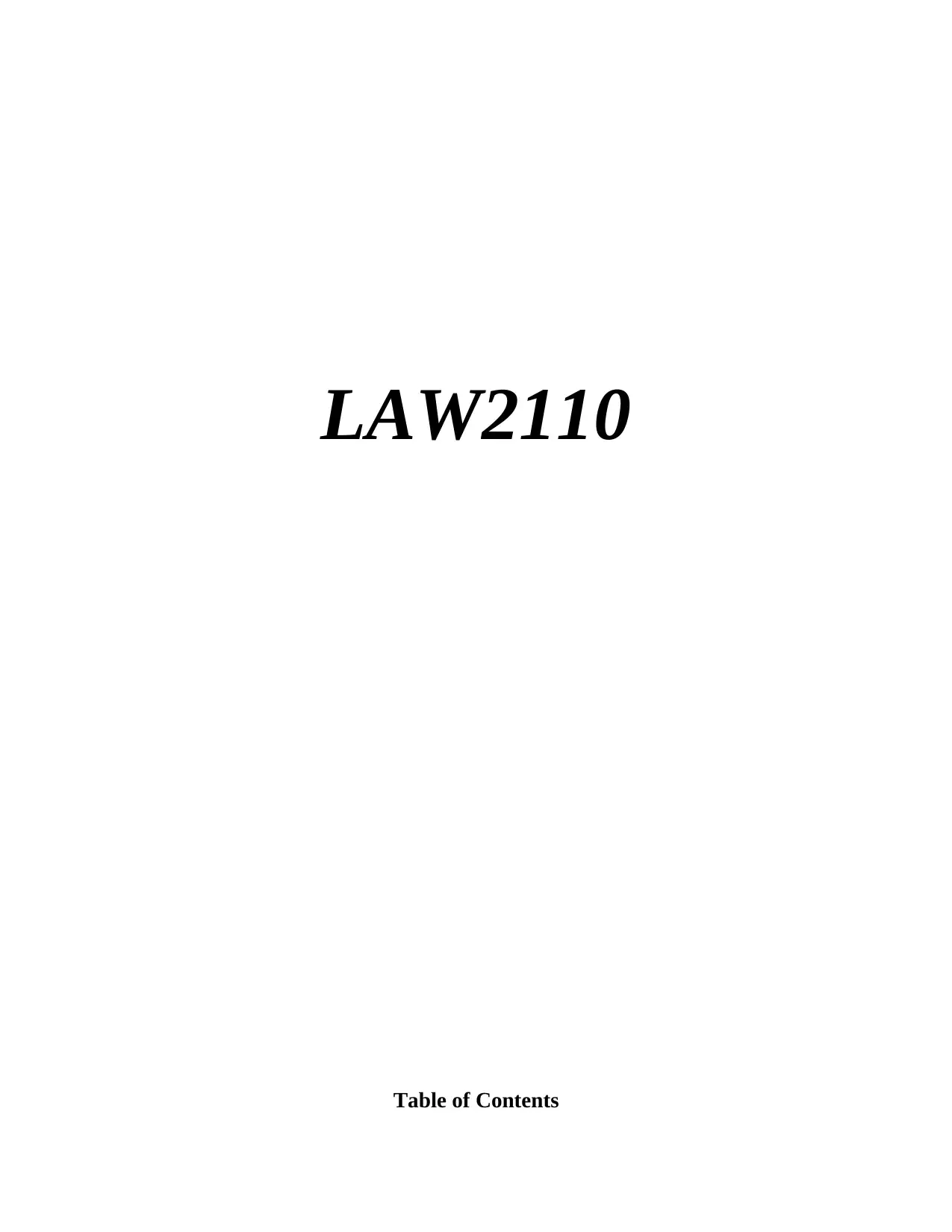
LAW2110
Table of Contents
Table of Contents
Paraphrase This Document
Need a fresh take? Get an instant paraphrase of this document with our AI Paraphraser
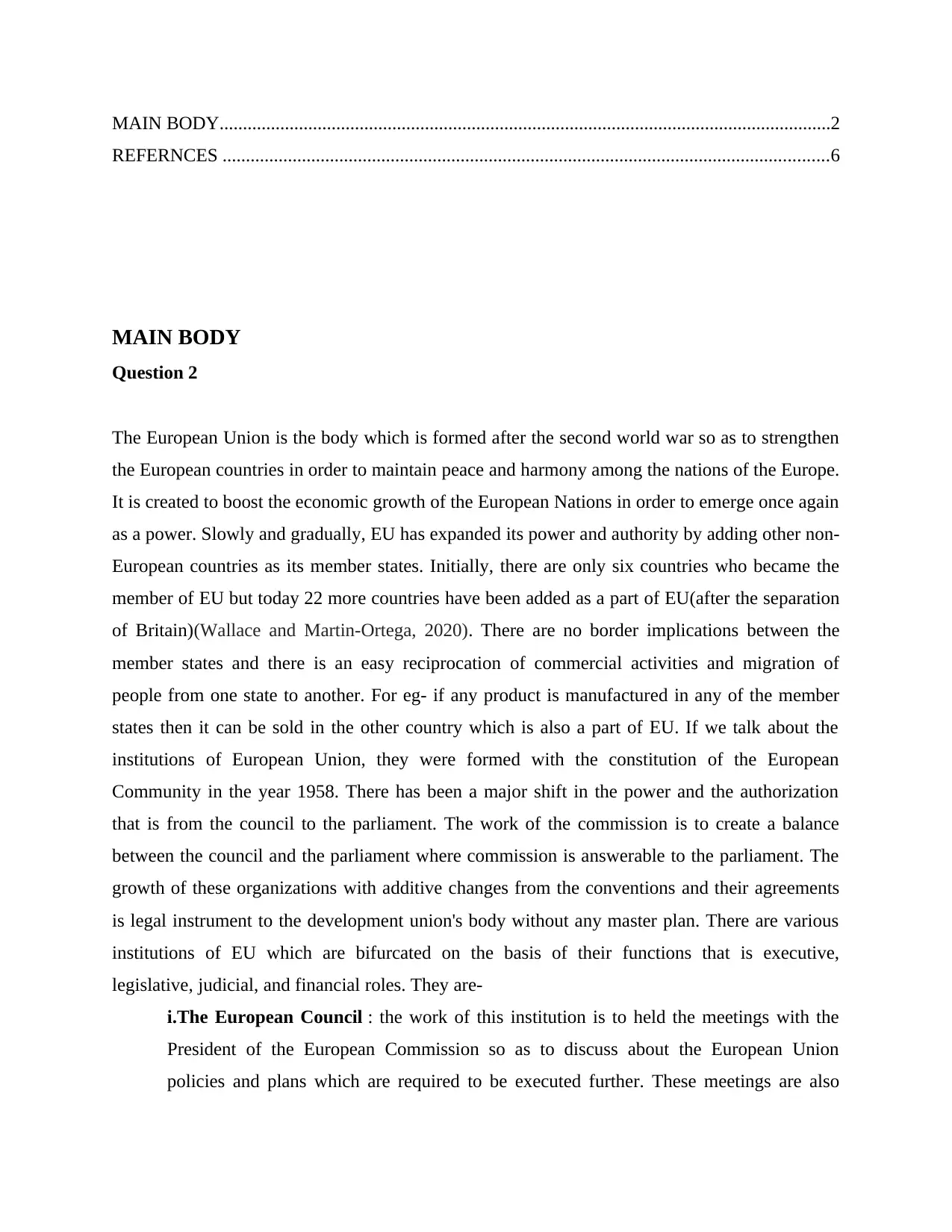
MAIN BODY...................................................................................................................................2
REFERNCES ..................................................................................................................................6
MAIN BODY
Question 2
The European Union is the body which is formed after the second world war so as to strengthen
the European countries in order to maintain peace and harmony among the nations of the Europe.
It is created to boost the economic growth of the European Nations in order to emerge once again
as a power. Slowly and gradually, EU has expanded its power and authority by adding other non-
European countries as its member states. Initially, there are only six countries who became the
member of EU but today 22 more countries have been added as a part of EU(after the separation
of Britain)(Wallace and Martin-Ortega, 2020). There are no border implications between the
member states and there is an easy reciprocation of commercial activities and migration of
people from one state to another. For eg- if any product is manufactured in any of the member
states then it can be sold in the other country which is also a part of EU. If we talk about the
institutions of European Union, they were formed with the constitution of the European
Community in the year 1958. There has been a major shift in the power and the authorization
that is from the council to the parliament. The work of the commission is to create a balance
between the council and the parliament where commission is answerable to the parliament. The
growth of these organizations with additive changes from the conventions and their agreements
is legal instrument to the development union's body without any master plan. There are various
institutions of EU which are bifurcated on the basis of their functions that is executive,
legislative, judicial, and financial roles. They are-
i.The European Council : the work of this institution is to held the meetings with the
President of the European Commission so as to discuss about the European Union
policies and plans which are required to be executed further. These meetings are also
REFERNCES ..................................................................................................................................6
MAIN BODY
Question 2
The European Union is the body which is formed after the second world war so as to strengthen
the European countries in order to maintain peace and harmony among the nations of the Europe.
It is created to boost the economic growth of the European Nations in order to emerge once again
as a power. Slowly and gradually, EU has expanded its power and authority by adding other non-
European countries as its member states. Initially, there are only six countries who became the
member of EU but today 22 more countries have been added as a part of EU(after the separation
of Britain)(Wallace and Martin-Ortega, 2020). There are no border implications between the
member states and there is an easy reciprocation of commercial activities and migration of
people from one state to another. For eg- if any product is manufactured in any of the member
states then it can be sold in the other country which is also a part of EU. If we talk about the
institutions of European Union, they were formed with the constitution of the European
Community in the year 1958. There has been a major shift in the power and the authorization
that is from the council to the parliament. The work of the commission is to create a balance
between the council and the parliament where commission is answerable to the parliament. The
growth of these organizations with additive changes from the conventions and their agreements
is legal instrument to the development union's body without any master plan. There are various
institutions of EU which are bifurcated on the basis of their functions that is executive,
legislative, judicial, and financial roles. They are-
i.The European Council : the work of this institution is to held the meetings with the
President of the European Commission so as to discuss about the European Union
policies and plans which are required to be executed further. These meetings are also
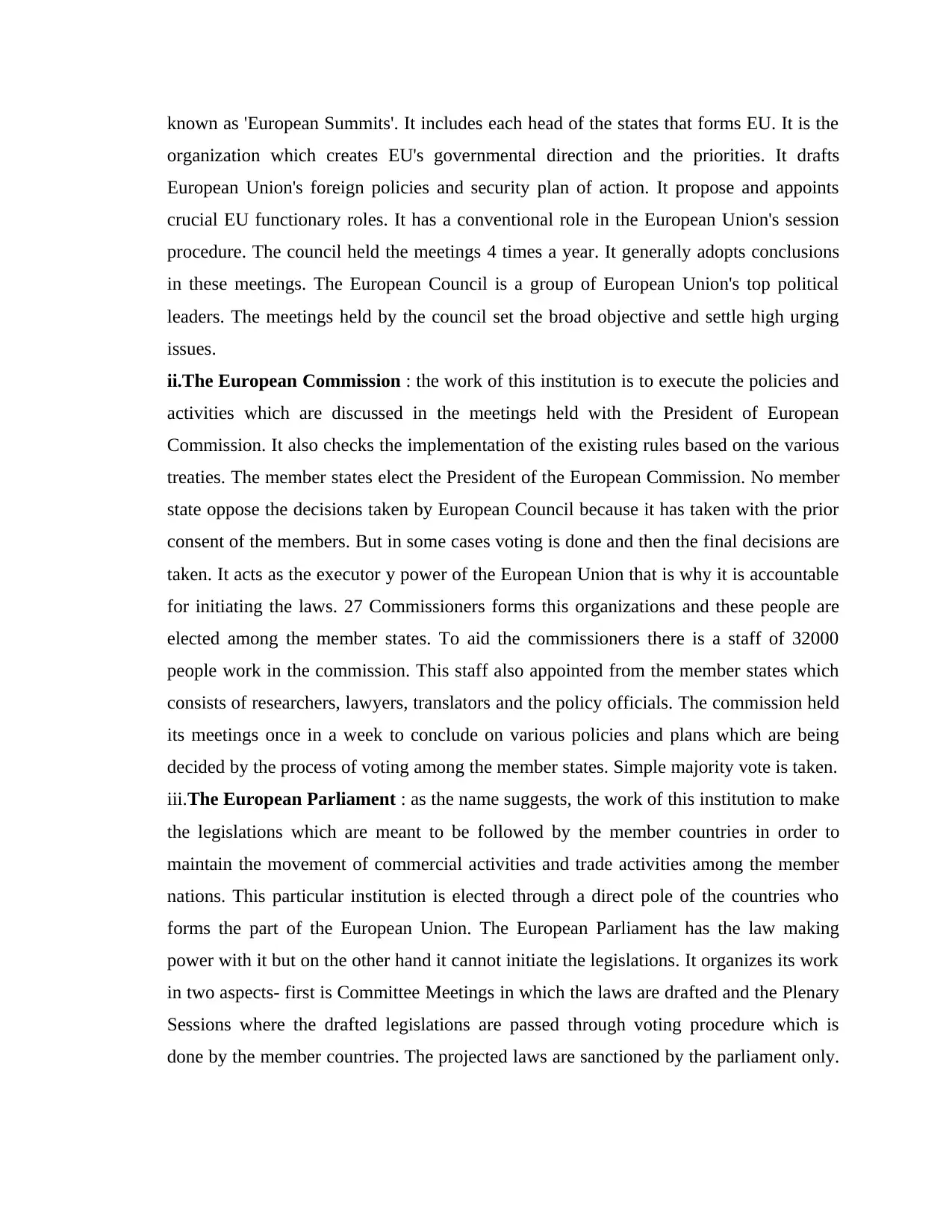
known as 'European Summits'. It includes each head of the states that forms EU. It is the
organization which creates EU's governmental direction and the priorities. It drafts
European Union's foreign policies and security plan of action. It propose and appoints
crucial EU functionary roles. It has a conventional role in the European Union's session
procedure. The council held the meetings 4 times a year. It generally adopts conclusions
in these meetings. The European Council is a group of European Union's top political
leaders. The meetings held by the council set the broad objective and settle high urging
issues.
ii.The European Commission : the work of this institution is to execute the policies and
activities which are discussed in the meetings held with the President of European
Commission. It also checks the implementation of the existing rules based on the various
treaties. The member states elect the President of the European Commission. No member
state oppose the decisions taken by European Council because it has taken with the prior
consent of the members. But in some cases voting is done and then the final decisions are
taken. It acts as the executor y power of the European Union that is why it is accountable
for initiating the laws. 27 Commissioners forms this organizations and these people are
elected among the member states. To aid the commissioners there is a staff of 32000
people work in the commission. This staff also appointed from the member states which
consists of researchers, lawyers, translators and the policy officials. The commission held
its meetings once in a week to conclude on various policies and plans which are being
decided by the process of voting among the member states. Simple majority vote is taken.
iii.The European Parliament : as the name suggests, the work of this institution to make
the legislations which are meant to be followed by the member countries in order to
maintain the movement of commercial activities and trade activities among the member
nations. This particular institution is elected through a direct pole of the countries who
forms the part of the European Union. The European Parliament has the law making
power with it but on the other hand it cannot initiate the legislations. It organizes its work
in two aspects- first is Committee Meetings in which the laws are drafted and the Plenary
Sessions where the drafted legislations are passed through voting procedure which is
done by the member countries. The projected laws are sanctioned by the parliament only.
organization which creates EU's governmental direction and the priorities. It drafts
European Union's foreign policies and security plan of action. It propose and appoints
crucial EU functionary roles. It has a conventional role in the European Union's session
procedure. The council held the meetings 4 times a year. It generally adopts conclusions
in these meetings. The European Council is a group of European Union's top political
leaders. The meetings held by the council set the broad objective and settle high urging
issues.
ii.The European Commission : the work of this institution is to execute the policies and
activities which are discussed in the meetings held with the President of European
Commission. It also checks the implementation of the existing rules based on the various
treaties. The member states elect the President of the European Commission. No member
state oppose the decisions taken by European Council because it has taken with the prior
consent of the members. But in some cases voting is done and then the final decisions are
taken. It acts as the executor y power of the European Union that is why it is accountable
for initiating the laws. 27 Commissioners forms this organizations and these people are
elected among the member states. To aid the commissioners there is a staff of 32000
people work in the commission. This staff also appointed from the member states which
consists of researchers, lawyers, translators and the policy officials. The commission held
its meetings once in a week to conclude on various policies and plans which are being
decided by the process of voting among the member states. Simple majority vote is taken.
iii.The European Parliament : as the name suggests, the work of this institution to make
the legislations which are meant to be followed by the member countries in order to
maintain the movement of commercial activities and trade activities among the member
nations. This particular institution is elected through a direct pole of the countries who
forms the part of the European Union. The European Parliament has the law making
power with it but on the other hand it cannot initiate the legislations. It organizes its work
in two aspects- first is Committee Meetings in which the laws are drafted and the Plenary
Sessions where the drafted legislations are passed through voting procedure which is
done by the member countries. The projected laws are sanctioned by the parliament only.
⊘ This is a preview!⊘
Do you want full access?
Subscribe today to unlock all pages.

Trusted by 1+ million students worldwide
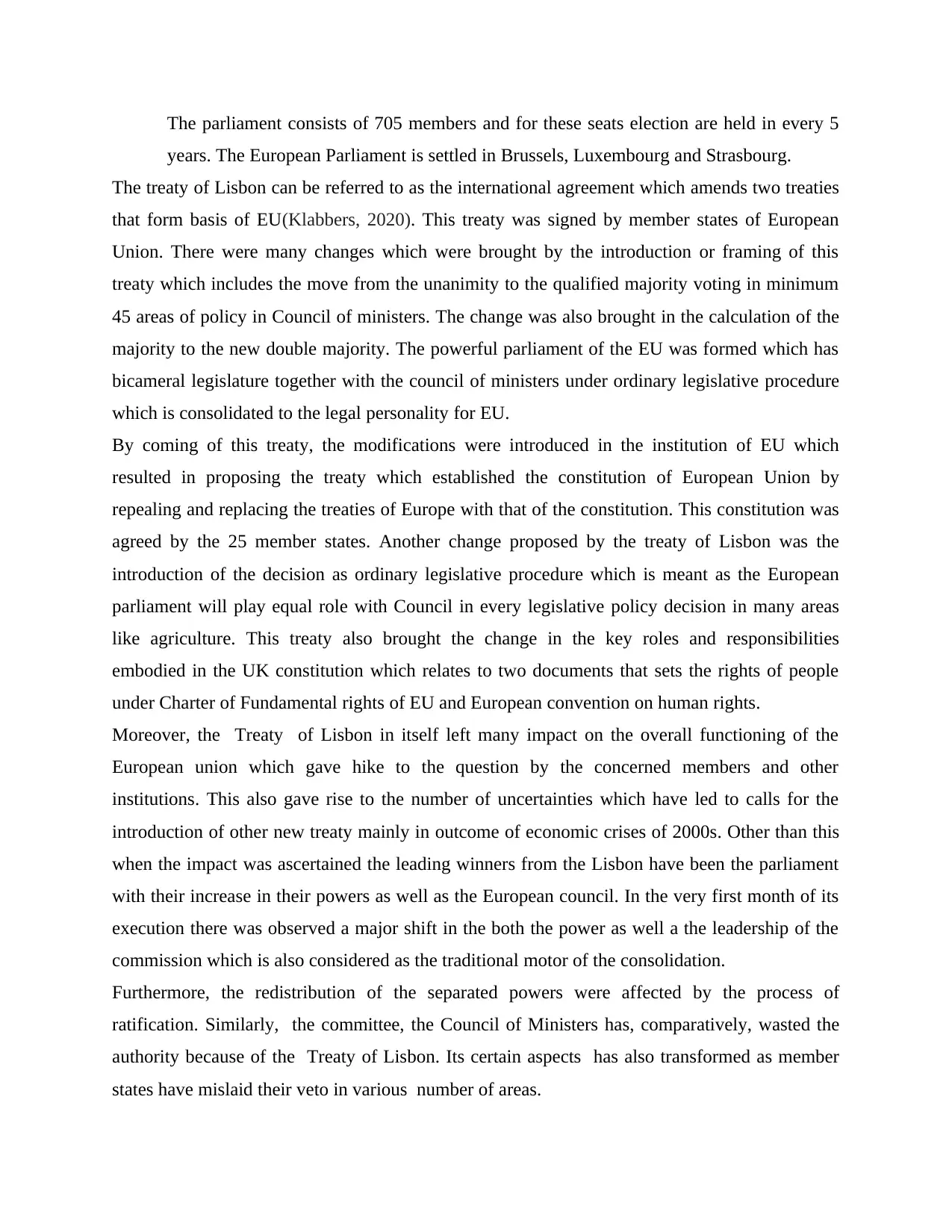
The parliament consists of 705 members and for these seats election are held in every 5
years. The European Parliament is settled in Brussels, Luxembourg and Strasbourg.
The treaty of Lisbon can be referred to as the international agreement which amends two treaties
that form basis of EU(Klabbers, 2020). This treaty was signed by member states of European
Union. There were many changes which were brought by the introduction or framing of this
treaty which includes the move from the unanimity to the qualified majority voting in minimum
45 areas of policy in Council of ministers. The change was also brought in the calculation of the
majority to the new double majority. The powerful parliament of the EU was formed which has
bicameral legislature together with the council of ministers under ordinary legislative procedure
which is consolidated to the legal personality for EU.
By coming of this treaty, the modifications were introduced in the institution of EU which
resulted in proposing the treaty which established the constitution of European Union by
repealing and replacing the treaties of Europe with that of the constitution. This constitution was
agreed by the 25 member states. Another change proposed by the treaty of Lisbon was the
introduction of the decision as ordinary legislative procedure which is meant as the European
parliament will play equal role with Council in every legislative policy decision in many areas
like agriculture. This treaty also brought the change in the key roles and responsibilities
embodied in the UK constitution which relates to two documents that sets the rights of people
under Charter of Fundamental rights of EU and European convention on human rights.
Moreover, the Treaty of Lisbon in itself left many impact on the overall functioning of the
European union which gave hike to the question by the concerned members and other
institutions. This also gave rise to the number of uncertainties which have led to calls for the
introduction of other new treaty mainly in outcome of economic crises of 2000s. Other than this
when the impact was ascertained the leading winners from the Lisbon have been the parliament
with their increase in their powers as well as the European council. In the very first month of its
execution there was observed a major shift in the both the power as well a the leadership of the
commission which is also considered as the traditional motor of the consolidation.
Furthermore, the redistribution of the separated powers were affected by the process of
ratification. Similarly, the committee, the Council of Ministers has, comparatively, wasted the
authority because of the Treaty of Lisbon. Its certain aspects has also transformed as member
states have mislaid their veto in various number of areas.
years. The European Parliament is settled in Brussels, Luxembourg and Strasbourg.
The treaty of Lisbon can be referred to as the international agreement which amends two treaties
that form basis of EU(Klabbers, 2020). This treaty was signed by member states of European
Union. There were many changes which were brought by the introduction or framing of this
treaty which includes the move from the unanimity to the qualified majority voting in minimum
45 areas of policy in Council of ministers. The change was also brought in the calculation of the
majority to the new double majority. The powerful parliament of the EU was formed which has
bicameral legislature together with the council of ministers under ordinary legislative procedure
which is consolidated to the legal personality for EU.
By coming of this treaty, the modifications were introduced in the institution of EU which
resulted in proposing the treaty which established the constitution of European Union by
repealing and replacing the treaties of Europe with that of the constitution. This constitution was
agreed by the 25 member states. Another change proposed by the treaty of Lisbon was the
introduction of the decision as ordinary legislative procedure which is meant as the European
parliament will play equal role with Council in every legislative policy decision in many areas
like agriculture. This treaty also brought the change in the key roles and responsibilities
embodied in the UK constitution which relates to two documents that sets the rights of people
under Charter of Fundamental rights of EU and European convention on human rights.
Moreover, the Treaty of Lisbon in itself left many impact on the overall functioning of the
European union which gave hike to the question by the concerned members and other
institutions. This also gave rise to the number of uncertainties which have led to calls for the
introduction of other new treaty mainly in outcome of economic crises of 2000s. Other than this
when the impact was ascertained the leading winners from the Lisbon have been the parliament
with their increase in their powers as well as the European council. In the very first month of its
execution there was observed a major shift in the both the power as well a the leadership of the
commission which is also considered as the traditional motor of the consolidation.
Furthermore, the redistribution of the separated powers were affected by the process of
ratification. Similarly, the committee, the Council of Ministers has, comparatively, wasted the
authority because of the Treaty of Lisbon. Its certain aspects has also transformed as member
states have mislaid their veto in various number of areas.
Paraphrase This Document
Need a fresh take? Get an instant paraphrase of this document with our AI Paraphraser
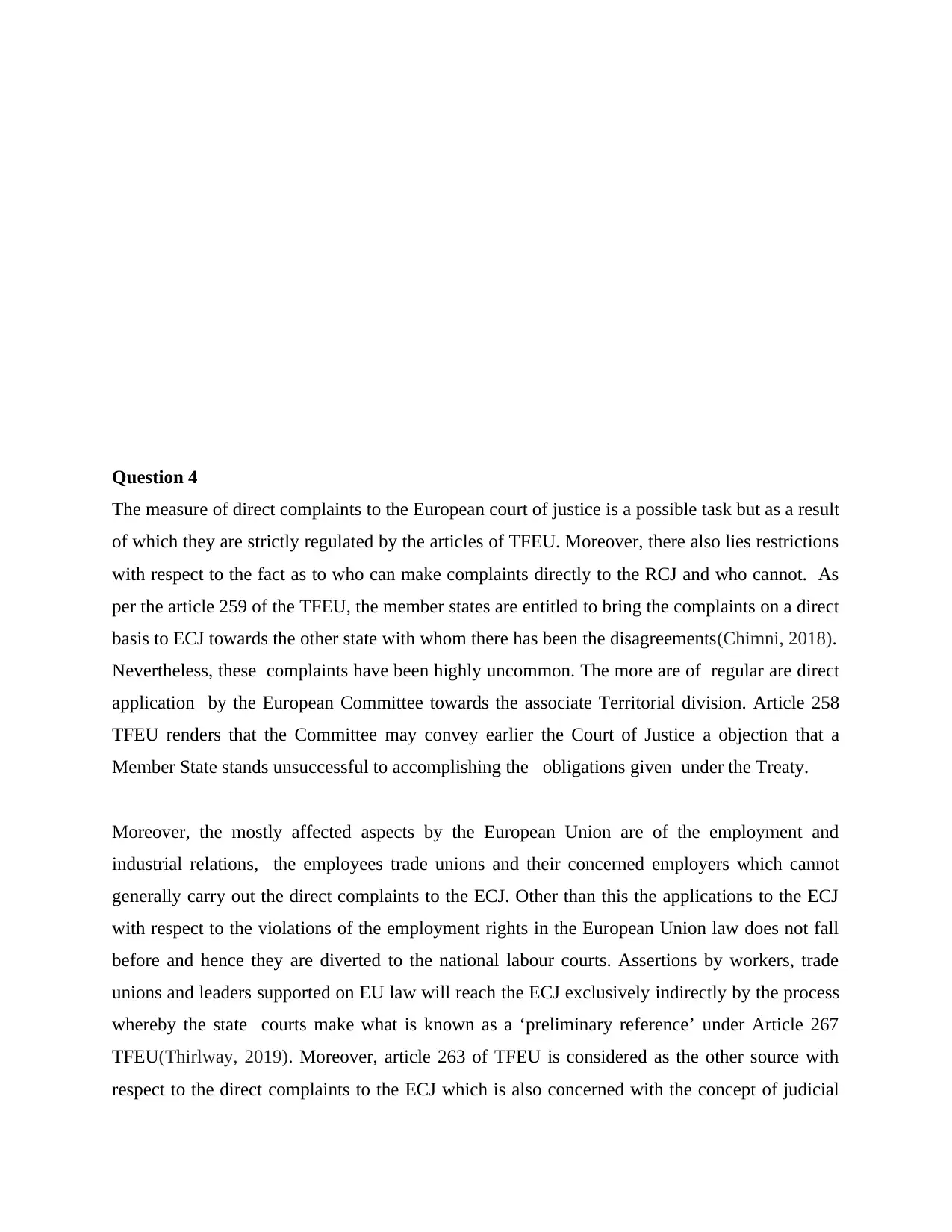
Question 4
The measure of direct complaints to the European court of justice is a possible task but as a result
of which they are strictly regulated by the articles of TFEU. Moreover, there also lies restrictions
with respect to the fact as to who can make complaints directly to the RCJ and who cannot. As
per the article 259 of the TFEU, the member states are entitled to bring the complaints on a direct
basis to ECJ towards the other state with whom there has been the disagreements(Chimni, 2018).
Nevertheless, these complaints have been highly uncommon. The more are of regular are direct
application by the European Committee towards the associate Territorial division. Article 258
TFEU renders that the Committee may convey earlier the Court of Justice a objection that a
Member State stands unsuccessful to accomplishing the obligations given under the Treaty.
Moreover, the mostly affected aspects by the European Union are of the employment and
industrial relations, the employees trade unions and their concerned employers which cannot
generally carry out the direct complaints to the ECJ. Other than this the applications to the ECJ
with respect to the violations of the employment rights in the European Union law does not fall
before and hence they are diverted to the national labour courts. Assertions by workers, trade
unions and leaders supported on EU law will reach the ECJ exclusively indirectly by the process
whereby the state courts make what is known as a ‘preliminary reference’ under Article 267
TFEU(Thirlway, 2019). Moreover, article 263 of TFEU is considered as the other source with
respect to the direct complaints to the ECJ which is also concerned with the concept of judicial
The measure of direct complaints to the European court of justice is a possible task but as a result
of which they are strictly regulated by the articles of TFEU. Moreover, there also lies restrictions
with respect to the fact as to who can make complaints directly to the RCJ and who cannot. As
per the article 259 of the TFEU, the member states are entitled to bring the complaints on a direct
basis to ECJ towards the other state with whom there has been the disagreements(Chimni, 2018).
Nevertheless, these complaints have been highly uncommon. The more are of regular are direct
application by the European Committee towards the associate Territorial division. Article 258
TFEU renders that the Committee may convey earlier the Court of Justice a objection that a
Member State stands unsuccessful to accomplishing the obligations given under the Treaty.
Moreover, the mostly affected aspects by the European Union are of the employment and
industrial relations, the employees trade unions and their concerned employers which cannot
generally carry out the direct complaints to the ECJ. Other than this the applications to the ECJ
with respect to the violations of the employment rights in the European Union law does not fall
before and hence they are diverted to the national labour courts. Assertions by workers, trade
unions and leaders supported on EU law will reach the ECJ exclusively indirectly by the process
whereby the state courts make what is known as a ‘preliminary reference’ under Article 267
TFEU(Thirlway, 2019). Moreover, article 263 of TFEU is considered as the other source with
respect to the direct complaints to the ECJ which is also concerned with the concept of judicial
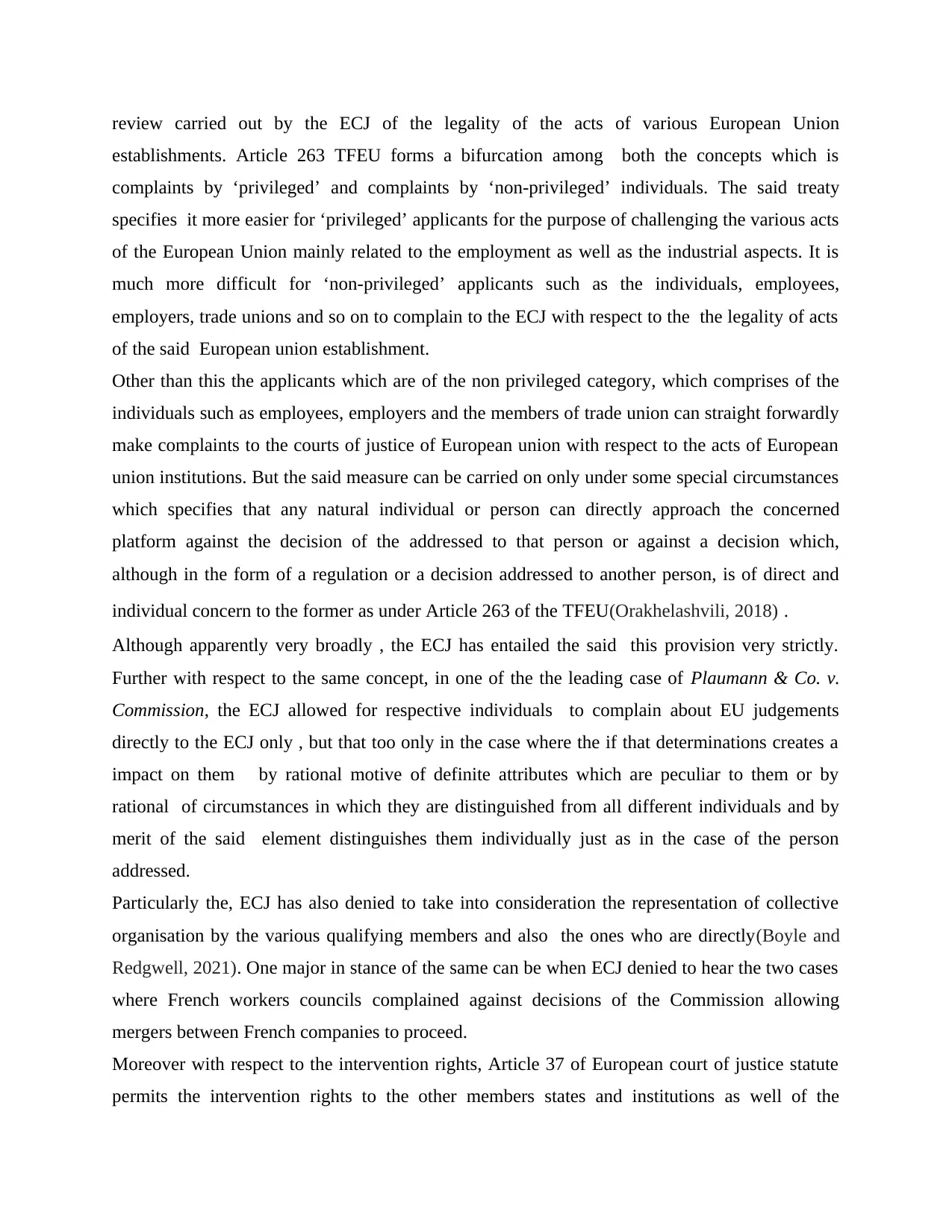
review carried out by the ECJ of the legality of the acts of various European Union
establishments. Article 263 TFEU forms a bifurcation among both the concepts which is
complaints by ‘privileged’ and complaints by ‘non-privileged’ individuals. The said treaty
specifies it more easier for ‘privileged’ applicants for the purpose of challenging the various acts
of the European Union mainly related to the employment as well as the industrial aspects. It is
much more difficult for ‘non-privileged’ applicants such as the individuals, employees,
employers, trade unions and so on to complain to the ECJ with respect to the the legality of acts
of the said European union establishment.
Other than this the applicants which are of the non privileged category, which comprises of the
individuals such as employees, employers and the members of trade union can straight forwardly
make complaints to the courts of justice of European union with respect to the acts of European
union institutions. But the said measure can be carried on only under some special circumstances
which specifies that any natural individual or person can directly approach the concerned
platform against the decision of the addressed to that person or against a decision which,
although in the form of a regulation or a decision addressed to another person, is of direct and
individual concern to the former as under Article 263 of the TFEU(Orakhelashvili, 2018) .
Although apparently very broadly , the ECJ has entailed the said this provision very strictly.
Further with respect to the same concept, in one of the the leading case of Plaumann & Co. v.
Commission, the ECJ allowed for respective individuals to complain about EU judgements
directly to the ECJ only , but that too only in the case where the if that determinations creates a
impact on them by rational motive of definite attributes which are peculiar to them or by
rational of circumstances in which they are distinguished from all different individuals and by
merit of the said element distinguishes them individually just as in the case of the person
addressed.
Particularly the, ECJ has also denied to take into consideration the representation of collective
organisation by the various qualifying members and also the ones who are directly(Boyle and
Redgwell, 2021). One major in stance of the same can be when ECJ denied to hear the two cases
where French workers councils complained against decisions of the Commission allowing
mergers between French companies to proceed.
Moreover with respect to the intervention rights, Article 37 of European court of justice statute
permits the intervention rights to the other members states and institutions as well of the
establishments. Article 263 TFEU forms a bifurcation among both the concepts which is
complaints by ‘privileged’ and complaints by ‘non-privileged’ individuals. The said treaty
specifies it more easier for ‘privileged’ applicants for the purpose of challenging the various acts
of the European Union mainly related to the employment as well as the industrial aspects. It is
much more difficult for ‘non-privileged’ applicants such as the individuals, employees,
employers, trade unions and so on to complain to the ECJ with respect to the the legality of acts
of the said European union establishment.
Other than this the applicants which are of the non privileged category, which comprises of the
individuals such as employees, employers and the members of trade union can straight forwardly
make complaints to the courts of justice of European union with respect to the acts of European
union institutions. But the said measure can be carried on only under some special circumstances
which specifies that any natural individual or person can directly approach the concerned
platform against the decision of the addressed to that person or against a decision which,
although in the form of a regulation or a decision addressed to another person, is of direct and
individual concern to the former as under Article 263 of the TFEU(Orakhelashvili, 2018) .
Although apparently very broadly , the ECJ has entailed the said this provision very strictly.
Further with respect to the same concept, in one of the the leading case of Plaumann & Co. v.
Commission, the ECJ allowed for respective individuals to complain about EU judgements
directly to the ECJ only , but that too only in the case where the if that determinations creates a
impact on them by rational motive of definite attributes which are peculiar to them or by
rational of circumstances in which they are distinguished from all different individuals and by
merit of the said element distinguishes them individually just as in the case of the person
addressed.
Particularly the, ECJ has also denied to take into consideration the representation of collective
organisation by the various qualifying members and also the ones who are directly(Boyle and
Redgwell, 2021). One major in stance of the same can be when ECJ denied to hear the two cases
where French workers councils complained against decisions of the Commission allowing
mergers between French companies to proceed.
Moreover with respect to the intervention rights, Article 37 of European court of justice statute
permits the intervention rights to the other members states and institutions as well of the
⊘ This is a preview!⊘
Do you want full access?
Subscribe today to unlock all pages.

Trusted by 1+ million students worldwide
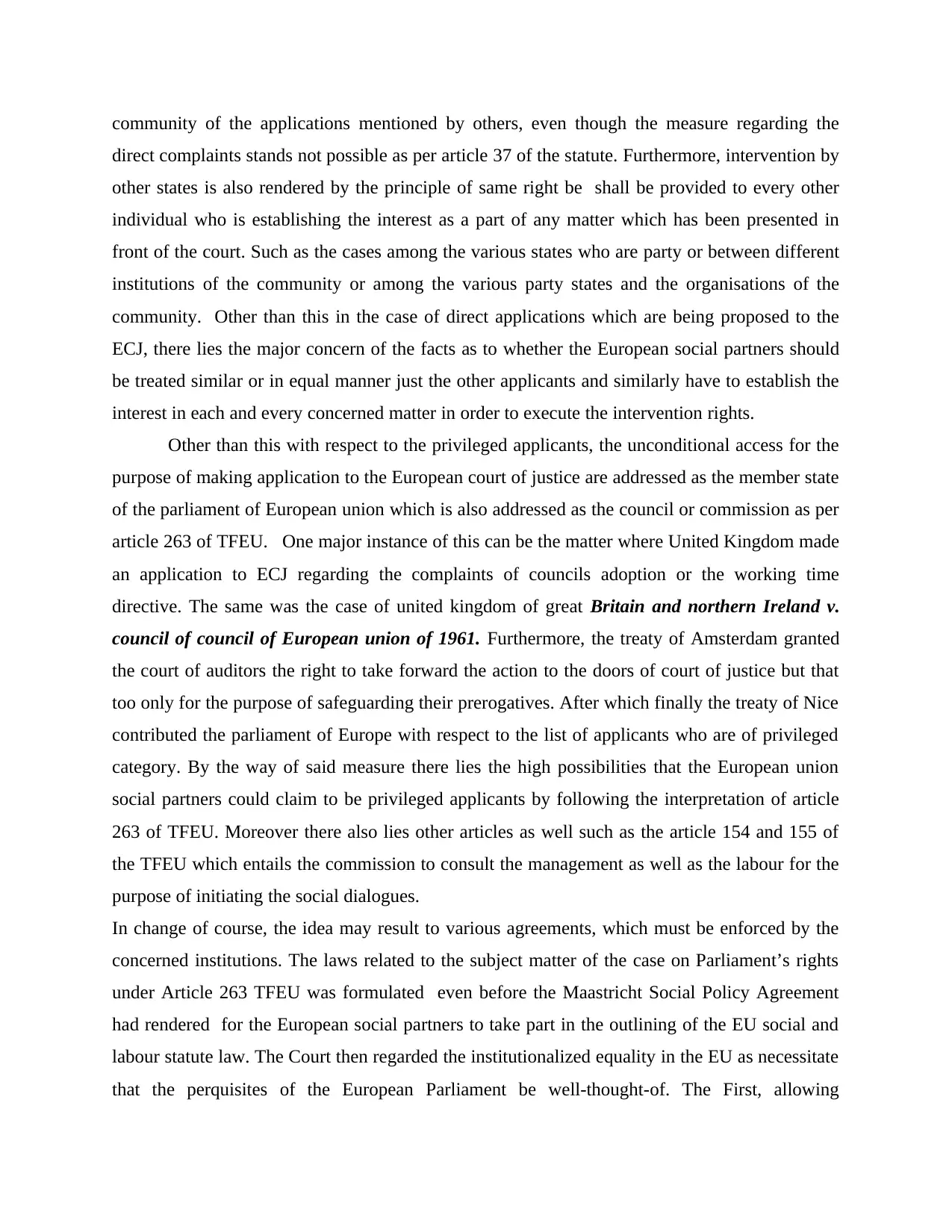
community of the applications mentioned by others, even though the measure regarding the
direct complaints stands not possible as per article 37 of the statute. Furthermore, intervention by
other states is also rendered by the principle of same right be shall be provided to every other
individual who is establishing the interest as a part of any matter which has been presented in
front of the court. Such as the cases among the various states who are party or between different
institutions of the community or among the various party states and the organisations of the
community. Other than this in the case of direct applications which are being proposed to the
ECJ, there lies the major concern of the facts as to whether the European social partners should
be treated similar or in equal manner just the other applicants and similarly have to establish the
interest in each and every concerned matter in order to execute the intervention rights.
Other than this with respect to the privileged applicants, the unconditional access for the
purpose of making application to the European court of justice are addressed as the member state
of the parliament of European union which is also addressed as the council or commission as per
article 263 of TFEU. One major instance of this can be the matter where United Kingdom made
an application to ECJ regarding the complaints of councils adoption or the working time
directive. The same was the case of united kingdom of great Britain and northern Ireland v.
council of council of European union of 1961. Furthermore, the treaty of Amsterdam granted
the court of auditors the right to take forward the action to the doors of court of justice but that
too only for the purpose of safeguarding their prerogatives. After which finally the treaty of Nice
contributed the parliament of Europe with respect to the list of applicants who are of privileged
category. By the way of said measure there lies the high possibilities that the European union
social partners could claim to be privileged applicants by following the interpretation of article
263 of TFEU. Moreover there also lies other articles as well such as the article 154 and 155 of
the TFEU which entails the commission to consult the management as well as the labour for the
purpose of initiating the social dialogues.
In change of course, the idea may result to various agreements, which must be enforced by the
concerned institutions. The laws related to the subject matter of the case on Parliament’s rights
under Article 263 TFEU was formulated even before the Maastricht Social Policy Agreement
had rendered for the European social partners to take part in the outlining of the EU social and
labour statute law. The Court then regarded the institutionalized equality in the EU as necessitate
that the perquisites of the European Parliament be well-thought-of. The First, allowing
direct complaints stands not possible as per article 37 of the statute. Furthermore, intervention by
other states is also rendered by the principle of same right be shall be provided to every other
individual who is establishing the interest as a part of any matter which has been presented in
front of the court. Such as the cases among the various states who are party or between different
institutions of the community or among the various party states and the organisations of the
community. Other than this in the case of direct applications which are being proposed to the
ECJ, there lies the major concern of the facts as to whether the European social partners should
be treated similar or in equal manner just the other applicants and similarly have to establish the
interest in each and every concerned matter in order to execute the intervention rights.
Other than this with respect to the privileged applicants, the unconditional access for the
purpose of making application to the European court of justice are addressed as the member state
of the parliament of European union which is also addressed as the council or commission as per
article 263 of TFEU. One major instance of this can be the matter where United Kingdom made
an application to ECJ regarding the complaints of councils adoption or the working time
directive. The same was the case of united kingdom of great Britain and northern Ireland v.
council of council of European union of 1961. Furthermore, the treaty of Amsterdam granted
the court of auditors the right to take forward the action to the doors of court of justice but that
too only for the purpose of safeguarding their prerogatives. After which finally the treaty of Nice
contributed the parliament of Europe with respect to the list of applicants who are of privileged
category. By the way of said measure there lies the high possibilities that the European union
social partners could claim to be privileged applicants by following the interpretation of article
263 of TFEU. Moreover there also lies other articles as well such as the article 154 and 155 of
the TFEU which entails the commission to consult the management as well as the labour for the
purpose of initiating the social dialogues.
In change of course, the idea may result to various agreements, which must be enforced by the
concerned institutions. The laws related to the subject matter of the case on Parliament’s rights
under Article 263 TFEU was formulated even before the Maastricht Social Policy Agreement
had rendered for the European social partners to take part in the outlining of the EU social and
labour statute law. The Court then regarded the institutionalized equality in the EU as necessitate
that the perquisites of the European Parliament be well-thought-of. The First, allowing
Paraphrase This Document
Need a fresh take? Get an instant paraphrase of this document with our AI Paraphraser
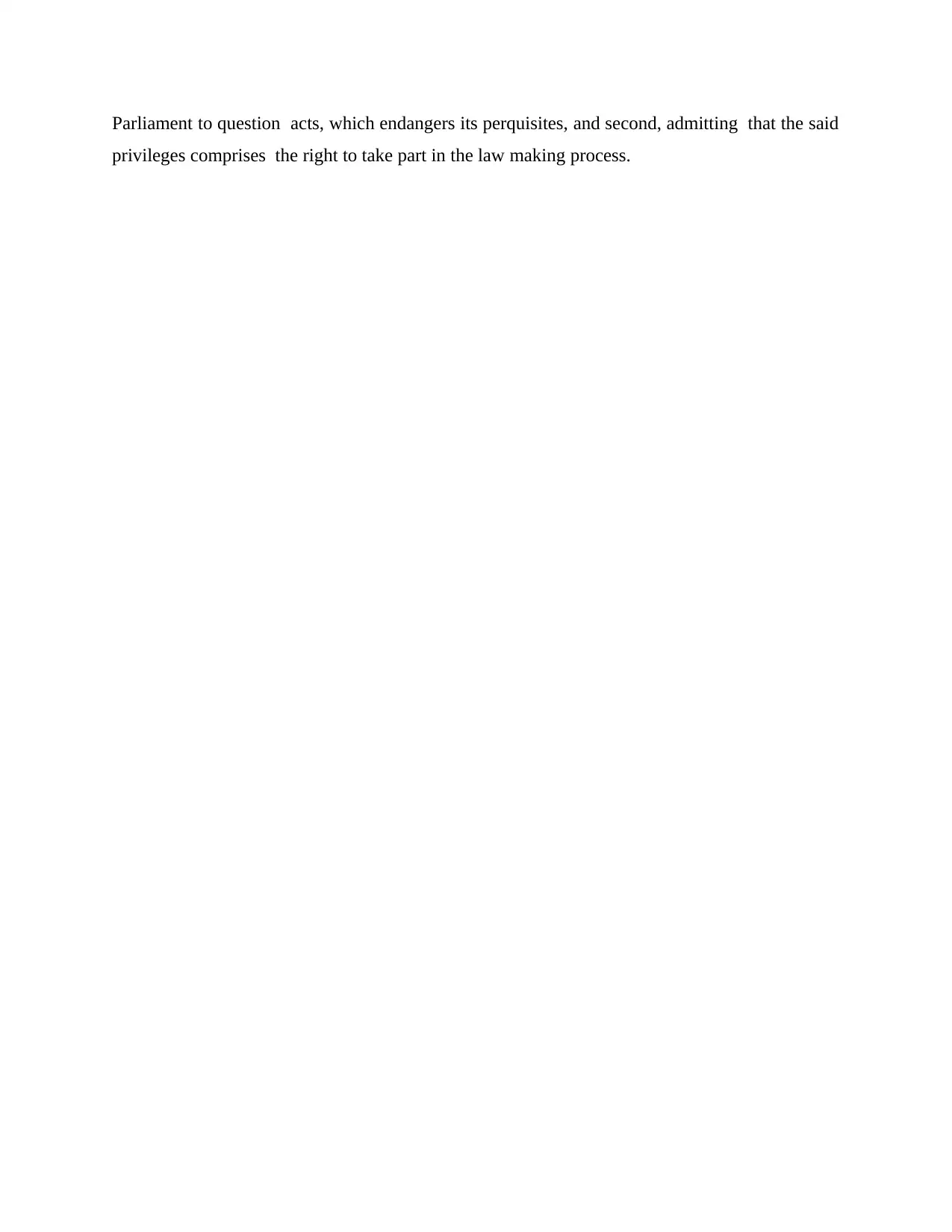
Parliament to question acts, which endangers its perquisites, and second, admitting that the said
privileges comprises the right to take part in the law making process.
privileges comprises the right to take part in the law making process.
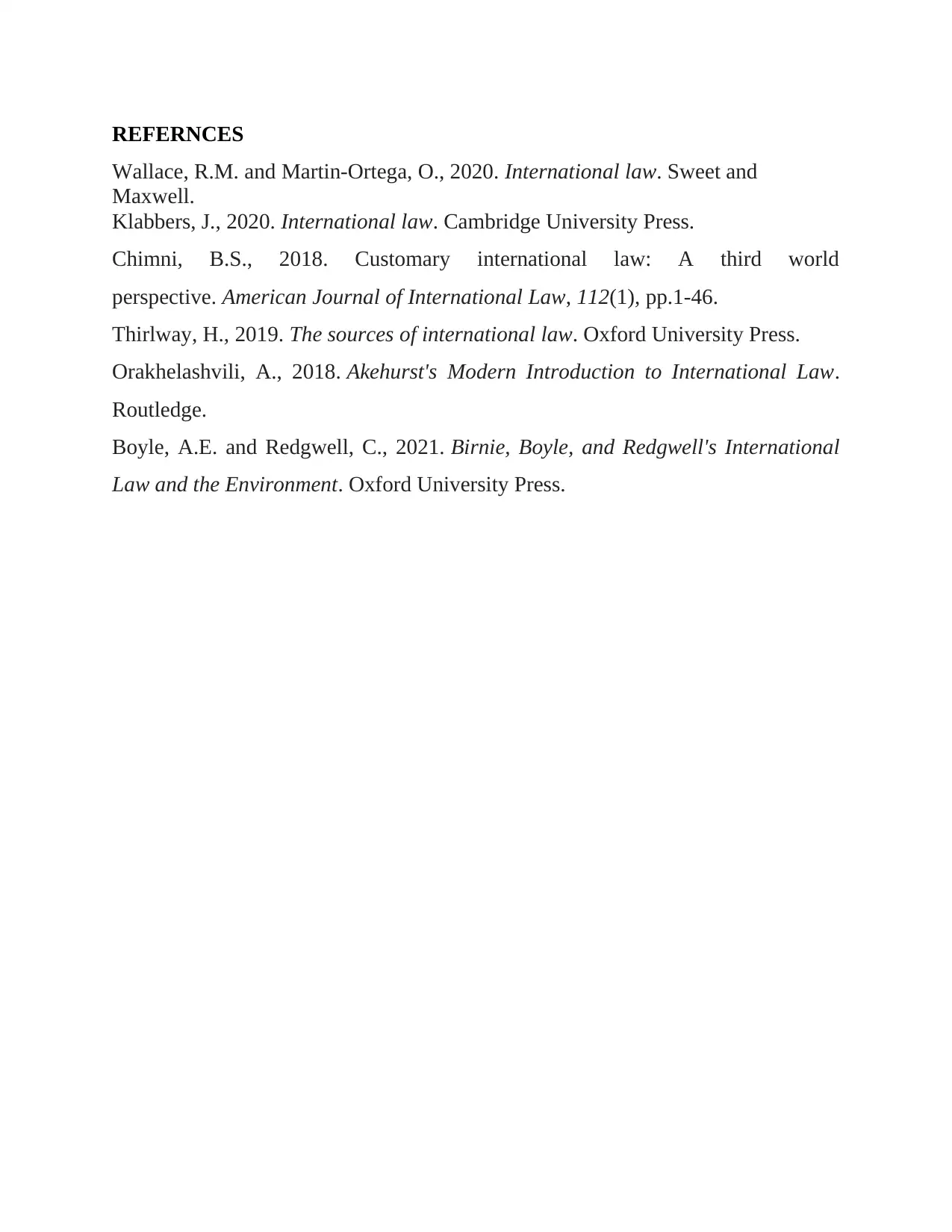
REFERNCES
Wallace, R.M. and Martin-Ortega, O., 2020. International law. Sweet and
Maxwell.
Klabbers, J., 2020. International law. Cambridge University Press.
Chimni, B.S., 2018. Customary international law: A third world
perspective. American Journal of International Law, 112(1), pp.1-46.
Thirlway, H., 2019. The sources of international law. Oxford University Press.
Orakhelashvili, A., 2018. Akehurst's Modern Introduction to International Law.
Routledge.
Boyle, A.E. and Redgwell, C., 2021. Birnie, Boyle, and Redgwell's International
Law and the Environment. Oxford University Press.
Wallace, R.M. and Martin-Ortega, O., 2020. International law. Sweet and
Maxwell.
Klabbers, J., 2020. International law. Cambridge University Press.
Chimni, B.S., 2018. Customary international law: A third world
perspective. American Journal of International Law, 112(1), pp.1-46.
Thirlway, H., 2019. The sources of international law. Oxford University Press.
Orakhelashvili, A., 2018. Akehurst's Modern Introduction to International Law.
Routledge.
Boyle, A.E. and Redgwell, C., 2021. Birnie, Boyle, and Redgwell's International
Law and the Environment. Oxford University Press.
⊘ This is a preview!⊘
Do you want full access?
Subscribe today to unlock all pages.

Trusted by 1+ million students worldwide
1 out of 9
Related Documents
Your All-in-One AI-Powered Toolkit for Academic Success.
+13062052269
info@desklib.com
Available 24*7 on WhatsApp / Email
![[object Object]](/_next/static/media/star-bottom.7253800d.svg)
Unlock your academic potential
Copyright © 2020–2026 A2Z Services. All Rights Reserved. Developed and managed by ZUCOL.




